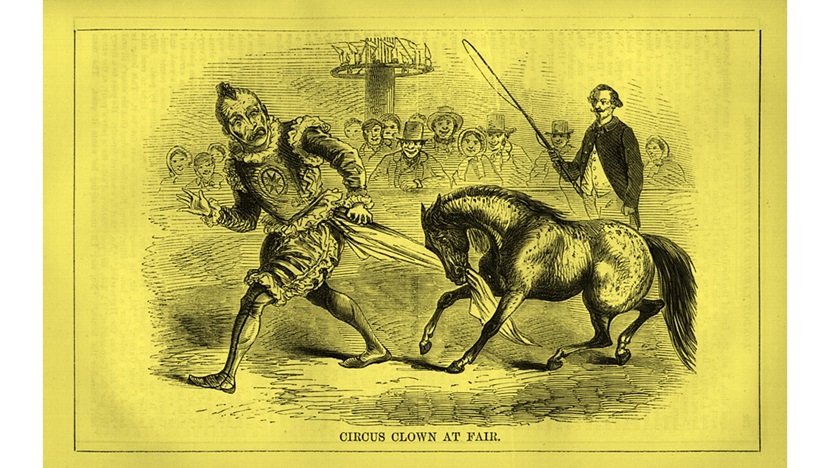.
Learning to Laugh
The pathos of a circus clown,
with empty pockets inside out,
now challenges a small boy’s frown.
Bewildered by the mimicked pouts,
the racoon eyes and painted tears,
he wonders what this clod’s about
who falls but never seems to fear
the squirting flowers or flying pies
as would be buddies laugh and jeer.
The boy forgets just why he cries
and tracks this fool with new found glee
who fails at every trick he tries.
The cheering crowd helps him to see
how pain is part of comedy.
.
.
An American Pastoral
Blushed blossoms unfurl in the earth-stirred air
along a promenade clipped postcard pretty.
Stone monuments declare our founders’ affairs
across the heart of this capital city.
Their cardinal points align our sense of duty;
the trail of trees details a captured beauty.
Fresh interns chat beneath these blooming bowers,
Encouraged by the robin’s serenade.
Fit soldiers stroll along with charming power,
their civic virtue suitably displayed.
Their steady steps secure the warbled rhyme;
the interns tap their toes and bide their time.
As squads of kites are tugged into the sky
and flit about our father’s pointed pillar,
along a sinking wall grieved mothers sigh
for sons consigned to crypts across the river.
These lost buds of youth they will not forget;
The fee for freedom: they have paid our debt.
.
.
William Harder is a recently retired high school teacher who taught theology and Spanish. He worked for twenty-five years with the immigrant community in New York City. He now lives on Staten Island and continues to tutor high school students in English and work as assistant coach for a boys’ high school track team. He has several poems published by Pivot and by Dappled Things.
















William, Welcome to the SCP! The terza rima is marvelous, well-crafted and flows nicely to a satisfying finale. American Pastoral touches a healing wound with a tenderness of springtime beauty that softens the sharp stark black granite while honoring the names inscribed in it. It is also one of those rare exceptions where the scattered near rhymes enhance the poem rather than distract from it. Well done. I hope you will share more with us.
Thank you James. Having read many well-crafted, thoughtful, clever poems on this page, I am glad to finally have my own verses included.
What a contrast. I was particularly taken by Learning to Laugh, with its traditional, for me a nostalgic clown, rather than a fang-toothed monster with a red balloon.
Thanks for the reads.
Thank you Paul. I was writing from childhood experiences many moons ago.
Enjoyed reading both. Thank you!
Thank you, William; these are both lovely poems. I agree with James; I love the terza rima in the first one. And I think it is especially poignant, in ‘Americal Pastoral”, that the poem begins with “Blushed blossoms” and ends with “lost buds of youth.”
Thanks Cynthia, with the second poem, I was going for a sober “Rites of Spring” where we remember those who paid the tab for the comforts we enjoy,.
I enjoyed both pieces, William, particularly ‘Learning to Laugh’ for its crispiness and smooth flow. ‘An American Pastoral’ is packed with many beautiful scenes. Thank you for sharing your work.
William, I enjoyed both poems, but for me, “Learning to Laugh” is something rather special. I like the images, but more than that, I love the lesson… the closing couplet is a triumph. Thank you.